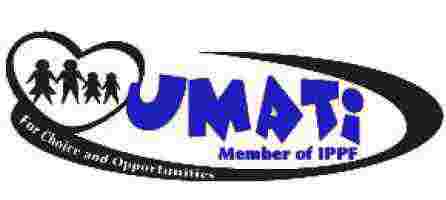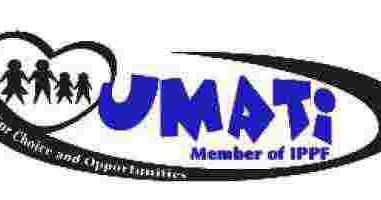
|
| Chama cha Uzazi na Malezi Bora Tanzania (UMATI) |
in Tanzania 2024: New Jobs Vacancies at UMATI 2024
💥UNASUBIRI NINI? FOLLOW US ON INSTAGRAM. CLICK HERE!💥
Chama cha Uzazi na Malezi Bora Tanzania (UMATI) Jobs 2024
Consultancy Opportunities at UMATI October 2024
PROJECT TITLE: STRENGTHENING YOUNG PEOPLE’S VOICE FOR ACCESS TO INTEGRATED COMPREHENSIVE SRH SERVICES IN MOROGORO AND IRINGA REGIONS, TANZANIA
INTRODUCTION
Chama
cha Uzazi na Malezi Bora Tanzania (UMATI) is an autonomous,
non-political national NGO providing Sexual and Reproductive Health and
Rights (SRHR) information, education, and services in Tanzania. It has
been in operation since 1959 and became a leading national organization
providing quality youth-friendly SRH information and services,
particularly to young people and women. In 1965 UMATI became a member
association for International Planned Parenthood Federation (IPPF) where
technical and core funds support was provided. By being a member of
IPPF, UMATI is internationally connected through experience sharing with
other IPPF member associations.
UMATI is envisioning to see a
Tanzania where people are free to choose and exercise their Sexual and
Reproductive Health and Rights without discrimination in gender, sex,
and age. The visioning process of UMATI highlighted the need to
integrate “without discrimination” as a recurring theme as well as an
organizational value statement. “Freedom of choice” was agreed as a
paramount inclusion at the end that UMATI would love to see by doing its
core business.
UMATI’s Mission Statement is to champion SRHR and
provide information and services targeting the young and underserved.
In coming up with the Mission Statement, cognizance was put on the
strategic position of UMATI as a leading SRHR service provider in
Tanzania. This
was eventually replaced by “champion” recognizing the need to lead not
only by the provision of services but also by enabling other service
providers including capacity building to local CSOs partners in the
country to champion SRHR through their advocacy initiatives. UMATI
strives for structural poverty reduction by improving the health of
people in the country regardless of gender and political or religious
beliefs, with priorities being given to the poorest communities and
hard-to-reach populations.
ABOUT THE PROJECT
This
project is a partnership between UMATI, and WGNNR AFRICA intended to
increase young people’s ability to collectively advocate for the
fulfillment of their SRHR and to live free from discrimination and
violence. The project was intended to amplify the voice of youth-led and
WROs to effectively advocate in a coordinated approach for young
people’s access to integrated, quality, youth-friendly SRHR information
and services. Specifically, the project will connect young people
advocates and health workers to work together using evidence-based
approaches to remove social, legal, and institutional barriers to
Adolescent Girls and Young Women’s (AGYWs) access to integrated SRH
services and information through joint advocacy campaigning, demand
creation, and service delivery; and to create of safe spaces that
facilitate mutual learning, sharing and supporting.
This project was implemented in two Regions namely: Morogoro
Iringa
PROJECT GOAL, OBJECTIVE, PURPOSE & INTERMEDIATE OUTCOMES
1 Goal
To
see all youth and women enjoy their bodily autonomy and SRHR with the
complete ability to fulfill their full potential free from gender or
age-related oppression or violence.
2 Objective:
To build the capacity of Youth-led CSOs to generate knowledge to influence policies and practice on SRHR and safe abortion –
- To
engage youth and women-led CSOs and networks at the regional and
national level to undertake advocacy and promote effective measures to
end gender inequalities and improve access to SRH and safe abortion. - To
strengthen local youth and women movements at the regional and national
level in shifting social norms and raising community awareness
regarding SRHR - To expand access to integrated, quality, and
right-based SRH and safe abortion services to poor, hard-to-reach,
vulnerable/marginalized youth and women of reproductive age using
innovative mobile outreach model and demand generation techniques. - To
build the capacity of government facilities to provide integrated,
quality, and right-based SRH and safe abortion services to poor,
hard-to-reach, vulnerable/marginalized youth and women using an
innovative cluster model.
3 Intermediate Outcomes
Improve
the ability of Y&WLCs and networks to undertake advocacy and
promote effective measures to end gender inequalities and improve SRHR
and safe abortion services; Increase the capacity of Y&WLCs and
networks to generate knowledge and evidence to influence policies and
practice on SRHR and safe abortion services; Increase knowledge, skills,
and attitudes of how to provide gender-responsive, youth-friendly
comprehensive SRH and safe abortion services among health service
providers; Increase the ability of health systems and institutions to
provide gender-responsive, youth-friendly comprehensive SRH.
APPROACH AND METHODOLOGY
The
endline survey is set to be conducted in Iringa and Morogoro regions by
an independent consultant, using a combination of qualitative and
quantitative methods. The successful consultant is required to present a
detailed endline design and methodology as part of their Work plan. The
endline design document should include a series of data collection
instruments that will be used during the survey.
DATA ANALYSIS
Prior
to the start of data collection, the consultant shall develop and
present a protocol for review and approval, a data analysis plan should
present details including how:
- Qualitative
data such as key informant, stakeholder, and beneficiary interviews
and/or focus group discussions will be transcribed and analyzed; - Quantitative data will be analyzed and presented.
- Whenever possible, data will be disaggregated and analyzed by age and gender.
COVERAGE
This
endline survey will be conducted in two regions namely Morogoro and
Iringa Regions in specific district councils which are Morogoro MC,
Kilosa DC, Mvomero DC, Kilolo, and Iringa MC where the project was
implemented. The endline data will provide coverage on interventions
which was conducted during the lifetime of project in the target
districts, Health care workers, community health workers, youth and
women-led civil society organizations, peer educators and women and
girls who were reached by the project interventions, in order to
understand the changes made by the project by making comparison between
the existing situation and what was found during baseline survey.
TERMS OF REFERENCE
UMATI
plans to carry out the endline of the project in order to effectively
measure the progress in achieving the objective of this project, UMATI
is aiming to hire a consultant to conduct the endline assessment in the
targeted intervention area in Iringa and Morogoro Region. This survey
will gather information about the existing current national, regional,
and district-level data on SRH.
OBJECTIVES OF THE SURVEY
The objective of the survey is to gather endline data for key project indicators which includes:
- Existing evidence synthesized and used for advocacy and policy engagement
- Increased
number of new users of SRHR services / information / products (e.g. new
users reaches by services, Comprehensive Sexuality Education, sanitary
pads) - Improved quality of services/ information/ products (using
recognised quality standard as defined in conjunction with CSO) (e.g.
better-quality youth friendly services) - Lessons learnt gathered,
disseminated and use by Amplify Change grantees (including:
AmplifyChange grantees generate lessons learned and use it to adapt
activities; AmplifyChange grantees adapt activities based on lessons
learnt from other grantees)
THE CONSULTANCY
For
this endline survey, UMATI in collaboration with identified consultant
will work closely to develop the survey tools and further sharpen the
methodology before the implementation of the work.
SCOPE OF WORK
The following is a general scope of work for the endline evaluation;
- To prepare and present the survey protocol;
- To prepare and present the developed survey tools;
- To apply for an ethical clearance certificate with support from UMATI;
- To work with UMATI M&E staff to finalize an appropriate survey design;
- To carry out a desk review of existing data/information related to the project available at the region and district level;
- To
translate the developed evaluation tools into the commonly spoken
language in the local areas and translated them back into English; - To work with UMATI in the recruitment and training of enumerators.
- To
coordinate logistics during collection of necessary data, supervision
of the survey team (enumerators), quality control of data, cleaning,
analysis, and interpretation of the findings; - To develop the endline report, prepare summary report (Endline fact sheet)
- Present the endline report to UMATI and Stakeholders;
REQUIREMENTS
UMATI
is looking for a consultant to conduct project’s endline survey with
the following set of skills, knowledge, and experience:
- Track record in developing and conducting similar of evaluation including qualitative and quantitative data collection
- Previous experience working with women, girls, and communities using participatory approaches
- Ability to write high-quality, clear, concise reports in English.
- An
advanced university degree in research, public health, population
studies, community health or similar speciality desirable, being a
Medical Doctor will be an added advantage. - A good understanding
of the local socio-economic context, particularly of issues relating to
Iringa and Morogoro region is a must. - Solid knowledge on SRHR.
TIMELINE
The endline study is scheduled to take place in the month on October 2024 – December 2024 as per below detailed workplan:
| Activity | October | November 2024 | December 2024
|
|||||
| W4 | W1 | W2 | W3 | W4 | W1 | W2 | W3 | |
| Conduct endline evaluation | ||||||||
| Sub Activity | ||||||||
| Hiring a consultant | √ | |||||||
| Review of the tools | √ | |||||||
| Application of ethical clearance | √ | √ | ||||||
| Recruitment and Training of enumerators | √ | |||||||
| Fieldwork (Data Collection) | √ | √ | ||||||
| Report Writing | √ | |||||||
| Submission of Final Evaluation report and dissemination workshop | √ | |||||||
SUBMISSION
applicant will submit electronic Expression of Interest (EOI) stating
his/her capability to conduct the evaluation; include a budget showing
details of all activities (e.g. # of days per person and description of
person’s job; the cost of tools, etc); proposed work plan with
timelines; curriculum vitae and description of similar project
assignments undertaken. The expressions of interest must be submitted by 01.11.2024 to Executive Director at: applications@umati.or.tz
The position should be the subject of the email application. Kindly note that only shortlisted applicants will be contacted.
UMATI is an equal-opportunity employer. Women and people with disability are highly encouraged to apply.



